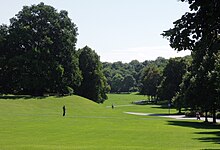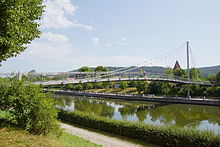Peter Kluska
Peter Kluska is a German landscape architect with an office in Munich , which he runs together with his wife Edit Kluska-Szügyi. Kluska has specialized in urban planning objectives, in which he creates open spaces, especially in their social quality. His best-known design is the Munich West Park , which was laid out in 1983 for the International Horticultural Exhibition. He is a member of the Bund Deutscher Landschaftsarchitekten and the Deutscher Werkbund .
Professional development
Kluska initially trained as a gardener and then studied landscape architecture in Weihenstephan. His first job was an internship at Hans Luz in Stuttgart. He then worked from 1964 to 1970 in Walter Rossow's office in Berlin. In 1970 he started his own business in Munich and has been working as a freelancer ever since. By participating in architecture competitions, he built up an independent profile and sees his main focus of work in designing object planning in urban and rural areas, with the urban development component increasing in later years.
From 1991 to 1997 he was a member of the city planning commission of the state capital Munich, since 1994 he has been a member of the German Academy for Urban Development and Regional Planning .
Kluska received an award for the cabinet garden of the Munich Residenz in 2005 as part of the German Landscape Architecture Prize.
Influences
He describes a visit to Sanssouci Park in Potsdam, which he was only able to visit in the mid-1960s as a West Berliner thanks to a special permit from the GDR authorities, as defining his understanding of spatial creation and spatial experience .
For Kluska, landscape architect is the “second most beautiful profession in the world”, only music has priority for him. He draws inspiration from Tchaikovsky and Mahler. For the city of Leipzig he designed the Augustusplatz between the Gewandhaus and the Leipzig Opera House while listening to a rehearsal of Tchaikovsky's Serenade No. 48 in C major under Kurt Masur through closed doors . He designed the surface of the square as a sheet of music on which the constant movement of people on the square would result in "an ever new score".
Projects (selection)
Kluska won more than 20 competitions between 1970 and 2010, which were also realized. These are:
- the open space design of the ZDF broadcasting center in Mainz, 1967–1977
- the Engelhaldepark in Kempten, 1981
- the Westpark in Munich, 1983
- the conception of the open spaces around the Third Order Clinic in Munich, 1983
- the bank design of the Main-Danube Canal in Berching, 1986
- the open spaces of the Max-Reger-Halle in Weiden in the Upper Palatinate, 1990
- the development planning of the University of Erfurt , 1995
- the exterior design of the Faculty of Chemistry and Pharmacy at the Ludwig Maximilians University in Munich-Großhadern
- the green space and facade design of Swiss Re's German headquarters in Unterföhring, 1999
- the Robert Bosch House and the Heidehof House of the Robert Bosch Foundation in Stuttgart, 2000
- the pioneer barracks on the Schanz in Ingolstadt
- the cabinet garden in Munich, 2003
- Inner courtyard and roof garden of the Palais Holnstein in Munich, 2009
literature
- Peter Kluska: Landscape Architecture: Projects + Competitions 1970–2010 . Hirmer 2013, ISBN 978-3-7774-5681-2
Individual evidence
- ↑ a b c P. Diemer: Architects in Bavaria 2 . Verlag Buch und Film 2000, ISBN 3-933687-04-7 , pages 184-187
- ↑ Kluska 2013, page 6
- ↑ Bund Deutscher Landschaftsarchitekten bdla: Cabinet garden in the Munich Residence - the smallest garden in the center of the city , German Landscape Architecture Prize 2005
- ↑ Kluska 2013, page 14
- ↑ Stefani Wandl: The oasis from the wasteland . Süddeutsche Zeitung, July 17, 2013, page R7
- ↑ Kluska 2013, page 238
| personal data | |
|---|---|
| SURNAME | Kluska, Peter |
| BRIEF DESCRIPTION | German landscape architect |
| DATE OF BIRTH | 20th century |


